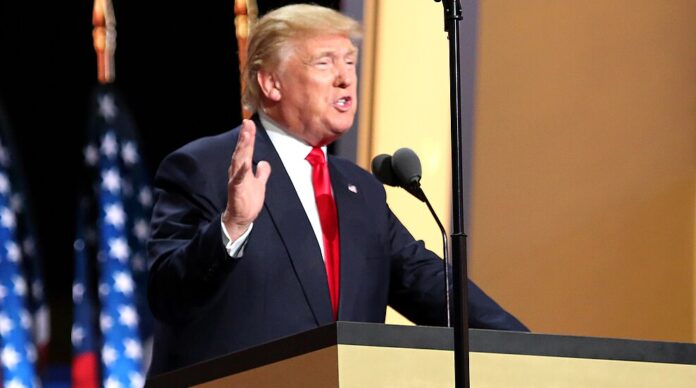During a tense hearing, justices scrutinize the authority of the New York Attorney General and the substantial penalty against the former president
In a pivotal legal showdown on Thursday, a New York appeals court delved into the $454 million civil fraud judgment against former President Donald Trump, igniting discussions about the severity of the penalty and the powers of the state’s Attorney General. Trump did not appear for the oral arguments, which involved his lawyers fighting to overturn a ruling made by Judge Arthur Engoron in February. The judge had found Trump, along with his sons Donald Trump Jr. and Eric Trump, liable for fraud and for issuing false financial statements.
As Trump’s legal team pushes for a reversal, this hearing unfolds amid his ongoing presidential campaign, which is now entering its critical final stages. Concurrently, his lawyers are seeking to dismiss several legal challenges, including a guilty verdict in a separate New York criminal case and federal election interference charges.
The five-judge appellate panel interrogated Deputy New York Solicitor General Judith Vale about the attorney general’s authority to pursue such a significant case. Justice Peter Moulton expressed concern over the size of the penalty, questioning its correlation to the alleged harm. “The immense penalty in this case is troubling,” he remarked, emphasizing the need for a clear connection between the penalty and the impact of the fraud.
Embed from Getty ImagesVale defended the substantial penalty as part of a disgorgement process intended to reclaim “ill-gotten gains.” She argued that the scale of the fraud committed justified the large sum. “Although this is a large number, it reflects the considerable benefit obtained through falsifying financial statements to secure better loan rates,” Vale explained.
The justices also scrutinized how the disgorgement amount was calculated, with Justice Llinet Rosado asking if it should have considered property valuations. Vale maintained that the calculations were appropriate, asserting that both the improved loan rates and profits from property sales were relevant to the penalty.
In addition to the penalty’s size, the court examined the statutory grounds on which Attorney General Letitia James, a Democrat, initiated the case against Trump. Justice David Friedman questioned the attorney general’s authority, noting that Deutsche Bank, which had lent to Trump, did not claim any harm from his actions. “It hardly seems to justify bringing an action to protect Deutsche Bank against President Trump,” he said, highlighting the sophisticated nature of the parties involved.
Vale countered that the law does not require a demonstration of harm by the banks, asserting that even if Deutsche Bank did not lose money, the misleading financial statements still warranted action. She emphasized that the law aims to protect honest businesses from fraudulent practices that could disrupt market integrity.
The judges raised concerns about the potential for overreach by the attorney general’s office, with Justice Moulton alluding to the need for limits on the scope of such legal actions. Vale defended the attorney general’s mandate, stating that the law is designed to protect against deceptive practices that harm the market and honest participants.
As the hearing concluded, it was evident that the appellate court was weighing both the legal precedents involved and the broader implications of the case, not just for Trump, but for the state’s authority in similar fraud cases in the future.
Analysis:
Political:
The New York appeals court hearing on Trump’s civil fraud case illustrates the intersection of law and politics, especially as Trump gears up for a pivotal election. The case has significant political ramifications for Trump, who has consistently portrayed legal challenges against him as politically motivated attacks. If the court upholds the judgment, it could further tarnish his reputation and impact his presidential campaign. The scrutiny of the Attorney General’s authority may also reflect broader political dynamics, as the Republican Party rallies around Trump in response to what they frame as an overreach by Democratic officials.
Social:
This case speaks to larger societal debates about accountability for powerful figures. The significant penalty against Trump highlights public sentiments around justice and fairness, particularly in an era when many feel that the wealthy often evade consequences for wrongdoing. The discussions in court regarding the lack of alleged victims raise questions about the nature of accountability and whether financial institutions like Deutsche Bank should bear some responsibility for their dealings with Trump. Social narratives around fraud, deception, and the impact on everyday citizens continue to resonate, fueling calls for greater transparency and ethical standards in business practices.
Gender:
Gender also plays a subtle role in this narrative, as the prominence of figures like Attorney General Letitia James brings attention to women’s leadership in legal and political spheres. James’s role in prosecuting a high-profile case against a former president showcases the increasing visibility of women in positions of authority, particularly in fields traditionally dominated by men. Her efforts to hold Trump accountable resonate with movements advocating for gender equality and the dismantling of patriarchal systems in various sectors, including politics and business.
Economic:
The $454 million penalty against Trump raises significant economic questions regarding the impacts of financial fraud on markets and investors. The discussion around disgorgement reflects broader concerns about the integrity of financial systems and the trust that individuals and institutions place in them. The case underscores the need for robust regulatory frameworks to deter fraudulent activities that can lead to economic instability. Additionally, the emphasis on protecting honest businesses suggests an economic environment where transparency and ethical behavior are increasingly valued by consumers and investors alike.
